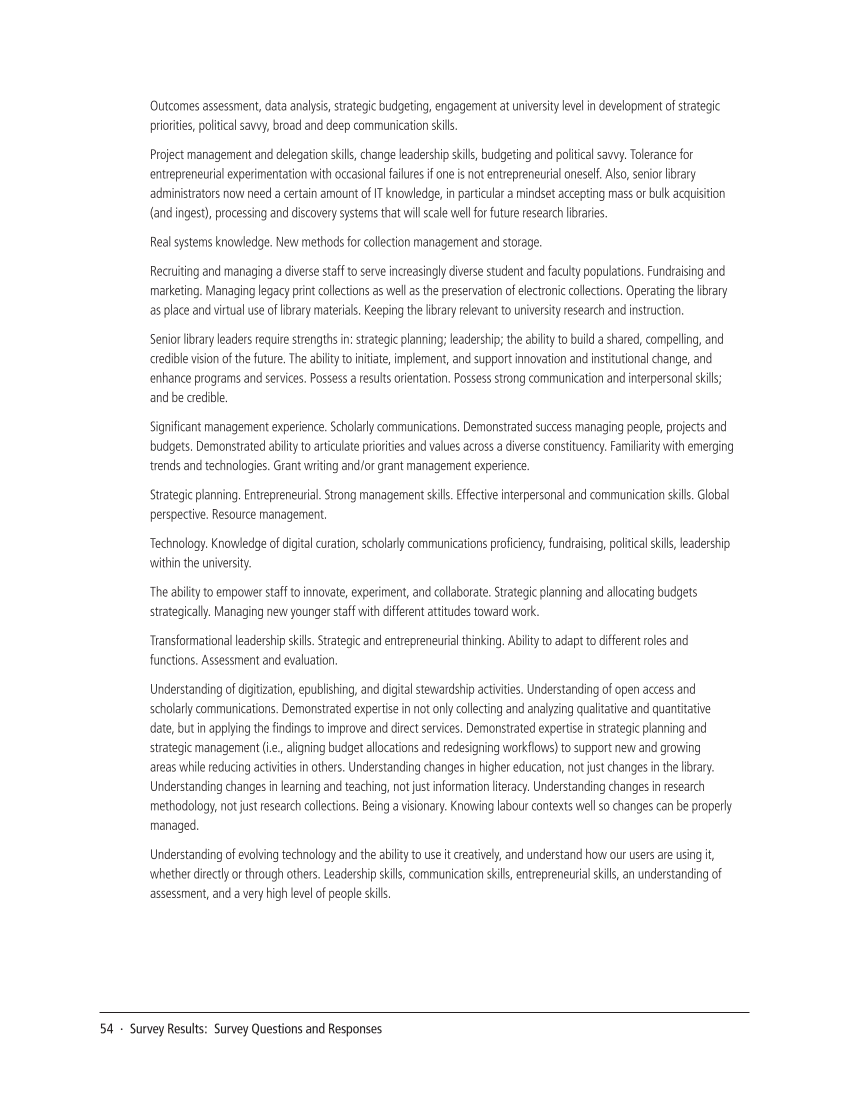54 · Survey Results: Survey Questions and Responses
Outcomes assessment, data analysis, strategic budgeting, engagement at university level in development of strategic
priorities, political savvy, broad and deep communication skills.
Project management and delegation skills, change leadership skills, budgeting and political savvy. Tolerance for
entrepreneurial experimentation with occasional failures if one is not entrepreneurial oneself. Also, senior library
administrators now need a certain amount of IT knowledge, in particular a mindset accepting mass or bulk acquisition
(and ingest), processing and discovery systems that will scale well for future research libraries.
Real systems knowledge. New methods for collection management and storage.
Recruiting and managing a diverse staff to serve increasingly diverse student and faculty populations. Fundraising and
marketing. Managing legacy print collections as well as the preservation of electronic collections. Operating the library
as place and virtual use of library materials. Keeping the library relevant to university research and instruction.
Senior library leaders require strengths in: strategic planning leadership the ability to build a shared, compelling, and
credible vision of the future. The ability to initiate, implement, and support innovation and institutional change, and
enhance programs and services. Possess a results orientation. Possess strong communication and interpersonal skills
and be credible.
Significant management experience. Scholarly communications. Demonstrated success managing people, projects and
budgets. Demonstrated ability to articulate priorities and values across a diverse constituency. Familiarity with emerging
trends and technologies. Grant writing and/or grant management experience.
Strategic planning. Entrepreneurial. Strong management skills. Effective interpersonal and communication skills. Global
perspective. Resource management.
Technology. Knowledge of digital curation, scholarly communications proficiency, fundraising, political skills, leadership
within the university.
The ability to empower staff to innovate, experiment, and collaborate. Strategic planning and allocating budgets
strategically. Managing new younger staff with different attitudes toward work.
Transformational leadership skills. Strategic and entrepreneurial thinking. Ability to adapt to different roles and
functions. Assessment and evaluation.
Understanding of digitization, epublishing, and digital stewardship activities. Understanding of open access and
scholarly communications. Demonstrated expertise in not only collecting and analyzing qualitative and quantitative
date, but in applying the findings to improve and direct services. Demonstrated expertise in strategic planning and
strategic management (i.e., aligning budget allocations and redesigning workflows) to support new and growing
areas while reducing activities in others. Understanding changes in higher education, not just changes in the library.
Understanding changes in learning and teaching, not just information literacy. Understanding changes in research
methodology, not just research collections. Being a visionary. Knowing labour contexts well so changes can be properly
managed.
Understanding of evolving technology and the ability to use it creatively, and understand how our users are using it,
whether directly or through others. Leadership skills, communication skills, entrepreneurial skills, an understanding of
assessment, and a very high level of people skills.
Outcomes assessment, data analysis, strategic budgeting, engagement at university level in development of strategic
priorities, political savvy, broad and deep communication skills.
Project management and delegation skills, change leadership skills, budgeting and political savvy. Tolerance for
entrepreneurial experimentation with occasional failures if one is not entrepreneurial oneself. Also, senior library
administrators now need a certain amount of IT knowledge, in particular a mindset accepting mass or bulk acquisition
(and ingest), processing and discovery systems that will scale well for future research libraries.
Real systems knowledge. New methods for collection management and storage.
Recruiting and managing a diverse staff to serve increasingly diverse student and faculty populations. Fundraising and
marketing. Managing legacy print collections as well as the preservation of electronic collections. Operating the library
as place and virtual use of library materials. Keeping the library relevant to university research and instruction.
Senior library leaders require strengths in: strategic planning leadership the ability to build a shared, compelling, and
credible vision of the future. The ability to initiate, implement, and support innovation and institutional change, and
enhance programs and services. Possess a results orientation. Possess strong communication and interpersonal skills
and be credible.
Significant management experience. Scholarly communications. Demonstrated success managing people, projects and
budgets. Demonstrated ability to articulate priorities and values across a diverse constituency. Familiarity with emerging
trends and technologies. Grant writing and/or grant management experience.
Strategic planning. Entrepreneurial. Strong management skills. Effective interpersonal and communication skills. Global
perspective. Resource management.
Technology. Knowledge of digital curation, scholarly communications proficiency, fundraising, political skills, leadership
within the university.
The ability to empower staff to innovate, experiment, and collaborate. Strategic planning and allocating budgets
strategically. Managing new younger staff with different attitudes toward work.
Transformational leadership skills. Strategic and entrepreneurial thinking. Ability to adapt to different roles and
functions. Assessment and evaluation.
Understanding of digitization, epublishing, and digital stewardship activities. Understanding of open access and
scholarly communications. Demonstrated expertise in not only collecting and analyzing qualitative and quantitative
date, but in applying the findings to improve and direct services. Demonstrated expertise in strategic planning and
strategic management (i.e., aligning budget allocations and redesigning workflows) to support new and growing
areas while reducing activities in others. Understanding changes in higher education, not just changes in the library.
Understanding changes in learning and teaching, not just information literacy. Understanding changes in research
methodology, not just research collections. Being a visionary. Knowing labour contexts well so changes can be properly
managed.
Understanding of evolving technology and the ability to use it creatively, and understand how our users are using it,
whether directly or through others. Leadership skills, communication skills, entrepreneurial skills, an understanding of
assessment, and a very high level of people skills.














































































































































































